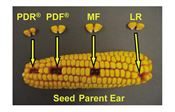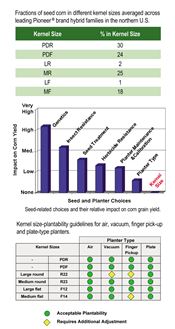Understanding Corn Seed Sizing
JOHNSTON, IOWA
When corn seed goes through the conditioning process, it is separated into fractions based on kernel size and shape creating uniformity.
• Fractions of seed corn in different kernel sizes averaged across leading Pioneer ® brand hybrid families in the northern U.S.
• Kernel size (small, medium or large) and shape (round or flat) is determined primarily by the position of the kernels on the ear.
• Seed size and shape can also vary by hybrid and weather conditions during seed production, including temperature and rainfall.
• Small round kernels originate from the ear tip, flats from the middle and large round kernels from the butt end of the ear.
• All kernel sizes from the same hybrid have the same yield potential.

• F denotes flat seed and R denotes round seed.
• L denotes large seed and M denotes medium seed.
• Precision design rounds and flats (PDR® seed and PDF® seed) reference specific sizes that are suitable to specific planter plates. The majority of the seed from an ear segregate into PDR seed and PDF seed fractions.
Impact of Seed Size
• Kernel size has minimal effect on seed vigor, field emergence or final yield.
• Seed is sized to maintain uniformity based on planter requirements.
• The most important factor in corn yield is the choice of hybrid (genetics). Planting the right hybrid with the desired agronomic traits will provide the best overall yield results.
• Nearly all kernel sizes can be successfully planted with all planter types. Additional adjustment may be required in some cases.
• For the most precise recommendations, you can directly access information for individual seed batch numbers and your specific planter type with our Plantability Tool.
• The Pioneer® Field360™ Plantability app easily scans a seed tag to provide planter setting recommendations, maximizing planter performance and seed-drop accuracy. This tool is available for iPad®, iPhone® and Android™ devices currently. ∆
